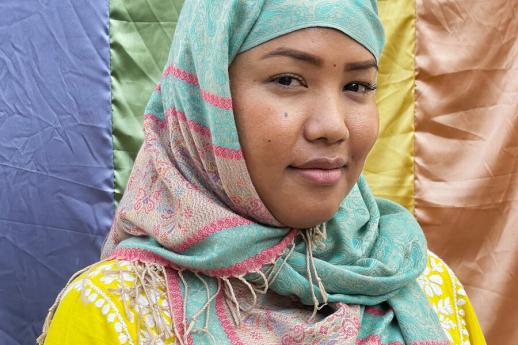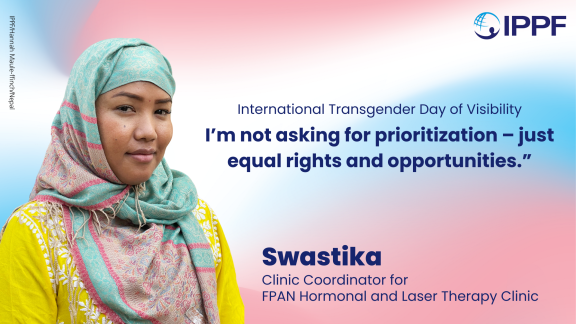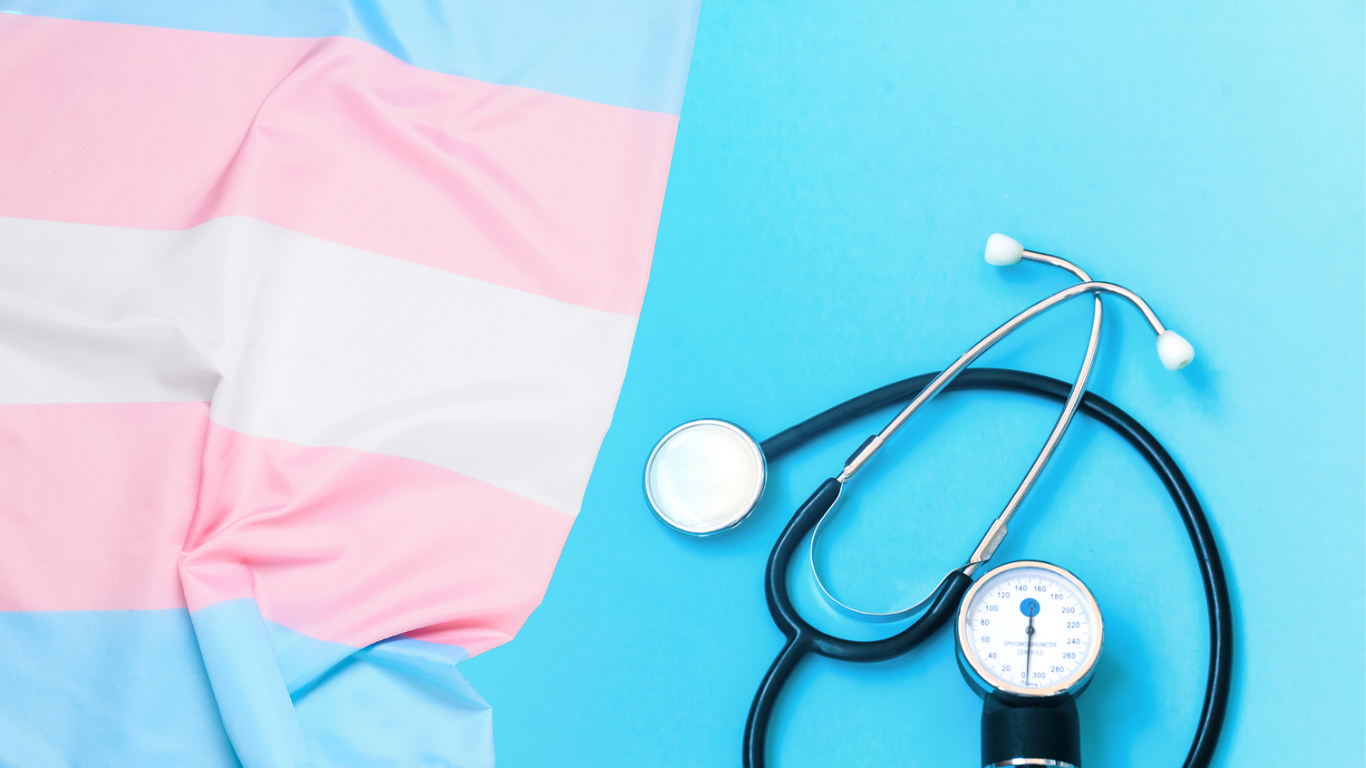“In my mind, I only ‘came out’ once – from my mother’s womb,” says Swastika, a transgender activist and clinic coordinator of Nepal’s first Hormonal and Laser Therapy Clinic for LGBTQIA+ people. The clinic was established in 2022 in collaboration with IPPF’s member association, the Family Planning Association of Nepal (FPAN) and the Blue Diamond Society (BDS), Nepal’s pioneering LGBTQIA+ organization.
Swastika’s journey as a transgender woman in Nepal has been a long one. She recalls leaving her family at the young age of 17 due to their initial rejection of her identity.
“I know how much I have faced since my childhood; I have been bullied and sexually harassed, even after transitioning ... people in Nepal are slowly starting to accept our community, but there are still hurdles. For example, we are charged twice as much in rent than non-transgender people,” reflects Swastika.
Nepal is often hailed as the ‘beacon of LGBTQIA+ rights in Asia’ and globally for its progressive laws towards gender and sexually diverse people. In a landmark 2007 Supreme Court decision (Blue Diamond Society and others v. Nepali Government), the court ordered the government to take three pivotal steps to strengthen the rights of LGBTQIA+ individuals: legally recognize a third gender category based on an individual’s self-identification; conduct a comprehensive audit of all laws to eliminate any discriminatory provisions against LGBTQIA+ people; and form a committee to study the legal recognition of same sex marriages. Following this ruling, the government implemented a directive allowing gender and sexually diverse individuals to specify their gender identity as ‘third gender’ or ‘other’ in official documents including citizenship, certificates, voter’s ID, passports and in the national census.
However, despite these progressive steps, the reality on the ground is very different. Gender and sexually diverse people still face bureaucratic and legal hurdles when it comes to self-identification. Currently, there is no legal option for those seeking to change their gender marker from ‘male’ to ‘female’ or vice versa. Similarly, implementation of the policy to obtain legal documents marked ‘other’ is unclear and inconsistent. There have been instances reported where individuals seeking to change their marker to ‘other’ have been forced to undergo medical interventions as a form of ‘proof’ of their gender identity. These medical interventions are often obtrusive and traumatizing for the individual, with a team of doctors and professionals present as they undress and are physically examined, a procedure no cis-gendered person is obliged to undertake to ‘prove’ their sex. Although some transgender individuals have successfully obtained legal documents reflecting their self-identification as ‘male’ or ‘female’, medical evidence has still been required.
when
country
Nepal
region
South Asia
Subject
LGBTI+
Related Member Association
Family Planning Association of Nepal

“I tried a case against the High Court to change my legal documents to have the female gender marker and won – but still haven’t been able to get my district to action these changes”, says Swastika, sharing her personal struggle with legal recognition in Nepal.

Despite the ongoing challenges, Swastika has remained committed to advocating for LGBTQIA+ rights, particularly in the field of sexual and reproductive health and rights (SRHR). Her journey includes work as a youth comprehensive sexuality education (CSE) campaigner with FPAN and contribution to human rights and HIV prevention efforts with BDS. Today, she serves as a clinic coordinator in the FPAN Hormonal and Laser Therapy clinic, continuing her dedication to supporting her community.
The clinic is Nepal’s first medical center offering Gender Affirming Hormone Therapy (GAHT) to transgender and third gender individuals. GAHT is one of the ways to medically transition for gender diverse people, wherein hormones are prescribed by the healthcare provider to help physically transition into the gender identity they self-identify with.

"I’m not asking for prioritization – just equal rights and opportunities.”
IPPF/Hannah Maule-ffinch/Nepal
“It is not that we promote every individual to get hormone replacement therapy (HRT), but we know there are people using the hormones without professional guidance. We only want them to use it with proper observation of the doctor. We are just saying that we are there for you. We can help you.” says Swastika.

Before the establishment of the FPAN Hormonal and Laser Therapy Clinic, resources for gender diverse people to learn about the transitioning process were scarce. Additionally, Nepal faces a severe shortage of HRT medicine, making access challenging. Hormones approved by the government are only allowed for usage, further limiting their availability.
“At first, we did not even know that we needed estrogen or testosterone for our body to transition”, explains Swastika. “There was no proper estrogen available, and we used contraceptive pills instead. However, using contraceptive pills as a form of hormone therapy is very bad and risky for our bodies ... we did not know where and how to get prescribed hormones. There was no specific doctor, or any health care provider specific for trans issues.”
The clinic has a team of specialists including a psychiatrist, endocrinologist, and dermatologist, providing comprehensive consultations for individuals 18 and above seeking HRT services. For minors under 18, one-on-one counseling is conducted with their legal guardian present. The process begins with counselling and psychiatric assessment to diagnose gender dysphoria. Upon approval, patients are briefed on the treatment, hormone options, and potential side effects. They must also undergo a blood test, which is free of cost for the first time, to assess their suitability for the treatment. Once approved, written consent is obtained and medication is prescribed for three months, with regular follow-ups in every three months interval to monitor reactions and to adjust the dosage accordingly.
In addition to HRT, the clinic offers cosmetic services like hydra-facials and laser treatment, along with psycho-social support. They provide awareness sessions on HRT, sexual and reproductive health and rights, sex education and the rights of LGBTQIA+ individuals in Nepal. They have also established a ‘safe space’ in the clinic, which includes a room with a back entrance that can be used as a judgment- free space for transgender people to speak, sing, dance, and experiment with make-up and clothing. While the services of the clinic specifically target transgender and third gender people, individuals, especially from the LGBTQIA+ community can also avail its services.

“I want every LGBTQIA+ person to know that this clinic does not just help with HRT but with other health issues as well. Even if the services are not available in our clinic, we will make sure to refer to other doctors that are LGBTQIA+ friendly,” shares Swastika.

Despite the staff's relentless efforts, the clinic is facing a shortage of funding and health experts. This has resulted in frequent staff turnover, affecting the continuity of their services. Nevertheless, the LGBTQIA+ community has warmly welcomed the establishment of the clinic, appreciating having a health facility specifically targeting their needs.
Swastika says, “We, the LGBTQIA+ community are already deprived from our society, from our community, family, schools, college and university. Now, let us not deprive ourselves of our health as well. We must be vocal, speak up, and be united. I’m not asking for prioritization – just equal rights and opportunities.”













